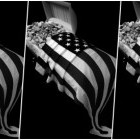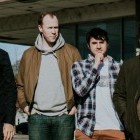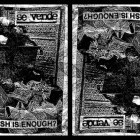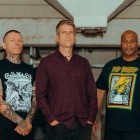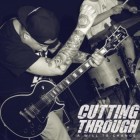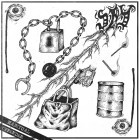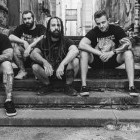27 years and 12 albums in, long-running political punks Anti-Flag are the subject of an upcoming documentary spanning the band’s storied and impassioned career. Years in the works, Beyond Barricades: The Story of Anti-Flag is a thorough and artful look at a band that’s forever operated at the convergence of music and activism.
On brand for the band, the film plays as both a conduit for resources and a love letter to the direct action the band has long inspired. As personal as it is occupied with worldly concerns, the documentary juxtaposes well the inner workings of an earnest band and the world-changing events that demarcate their career.
The documentary is a staggering work and a reminder that Anti-Flag have and will always be necessary.
In partnership with Alternative Press, this labor of love is at last set to premiere October 3rd on the livestream site Veeps.
I had the distinct pleasure and opportunity to chat with Jon Nix, co-founder of TurnStyle Films and Director/Editor of Beyond Barricades: The Story of Anti-Flag. Also, keep an eye out for yet another upcoming documentary, Don’t Fall In Love with Yourself, profiling the ever-prolific Justin Pearson and San Diego punk.
First and foremost, kudos on the documentary, but also 10 years of TurnStyle Films, the Cleveland-based production company you co-founded. Walk us through your bonafides!
Thank you! Our team started working together in October of 2010. Since then we've worked on dozens of music videos, mostly for punk and metal bands. We have a half dozen short films under our belt.
We put out our first co-produced film earlier this year, Powerbomb. It's a thriller about an obsessed fan who kidnaps his favorite wrestler just as he's about to break into the bigtime. And now we're following it up with this documentary, so it feels like a pretty big year for us.
The work that goes into something like this must be immense. Give us the scope of it. How long has this project been in the works? What was the impetus for it?
It was about seven years of work on and off. Our first meeting with them was in the spring of 2013. I met Chris Stowe, their label manager, when he lived in Cleveland. We stayed in touch. Then one day I got a text saying that he had a ton of footage and wanted to know if we'd be interested in doing a documentary.
How does Anti-Flag factor into your personal history?
I had always respected Anti-Flag but couldn't get into it when I was younger. I remember being in love with the cover art for A New Kind of Army but just couldn't connect to the album. So once it was offered to us, I jumped back in and it ended up clicking for me.
Movies take years to make, so you have to be careful about what subjects you pick. Because they need to be something that can sustain your interest through all the work. And I could feel that this was one of those things.
After the initial meeting, most of the first year was spent solely on importing and organizing all of the footage from their archive of VHSs and Mini-DV tapes. That ended up being about 300 hours of footage to go through. After that we dove in. But we also had day jobs and other projects to produce.
So the work would come in waves and it slowly developed over the years into something we felt worked.
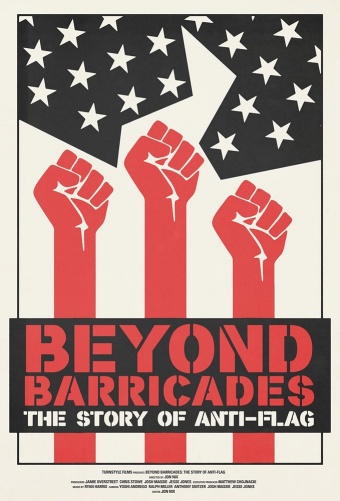
One thing I appreciate about the film is that it’s not posthumous. It comes across as a living document of a still active band that lends it an electricity of sorts. How’d you manage to balance the inherent nostalgia with a going proposition like Anti-Flag?
You always have an idea of what you want the story to be when you go into a new film, but as you shoot and start building sequences out, the themes reveal themselves. And the thing it all kept coming back to was that they never stop. There are so many moments in their story where you go "Okay I could see why you'd quit." But they never did.
They're very much in the moment and don't rest on their laurels. They're always speeding ahead so it makes it hard to ever get caught in one moment. They're not nostalgic for any one time so it would make it hard for the film to be.
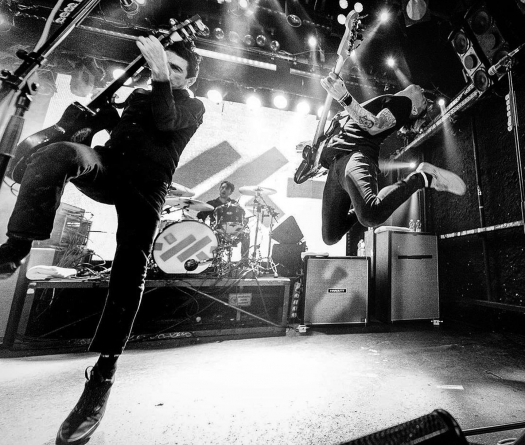
You deftly handle some really intense and weighty topics without sensationalizing them. Both 9/11 and Trump’s election factor heavily in the band’s history and, subsequently, the film itself. You gave both of these sections the space they require and almost step back from the band, at times. What was the process when handling this?
There's a lot of rhetoric that people may like to say when there's nothing at stake and when some kind of world event puts those ideas to the test a lot of times people fold and get in line. But the band's reaction always seemed to be a self-reflective one. They would pull back and really consider the situation before saying anything and I felt that the documentary needed to do the same.
When you look at history there's always that "What would I have done?" feeling, especially right now. And I think that it's always important to stay true to your political beliefs while remaining empathetic to others.
There are countless punk bands that could warrant the retrospective treatment, but Anti-Flag is perhaps more important than all of them. Based on fan testimonials, they’ve launched an unknowable amount of activists, advocates, and direct action. The documentary serves as a more fleshed out version of their discography. How important was this going in?
I think albums are a great roadmap to look at where bands are at any given moment in their lives. If a band is playing from the heart then there's no way it won't show up in the album and so by looking at the albums you can see where they were at any given time and then dig into those stories.
Without naming names, I’ve seen some inherently political bands that come off a bit self-aggrandizing on film. Anti-Flag seems unbelievably earnest and, in fact, a large amount of their non-profit work and activism is done without any self promotion. They’ve long had my respect as a band, but your film helped me fall in love with them all over again. How has your impression of the band changed after this project?
It's definitely not posturing with them. Or self-congratulatory. The first time I met [vocalist/guitarist] Justin [Sane] he walked in carrying a Noam Chomsky book in one hand and hugged me with the other.
These guys really do think about this stuff every day and take it very seriously. Right down to doing coat drives on winter tours and letting organizations like Planned Parenthood table and speak at their shows. Those little things add up and they're a band that takes the time to set those moments up.
I think when we first met I was expecting them to be more self-serious and standoffish. And it turned out to be the opposite. They're really funny guys who are willing to laugh at themselves. And they're very hands on. They were involved every step of the way and opened a lot of doors for us to make it a better film.
Much like the band of the oft-interviewed Tom Morello, Anti-Flag has long served as a gateway band. Whether furthering someone’s journey down the respective rabbit holes of punk or leftist politics, talk a little about the importance of being highly visible and accessible.
There's just so much content coming out all the time, whether it be film or music, and you really have to be out there and make yourself available. There are only a select few people who can go away for years and then drop something and still get the same amount of attention. And when it comes to politics it's even more important.
The world changes so much every day and it's important to be out there, helping guide people through the chaos of it all.
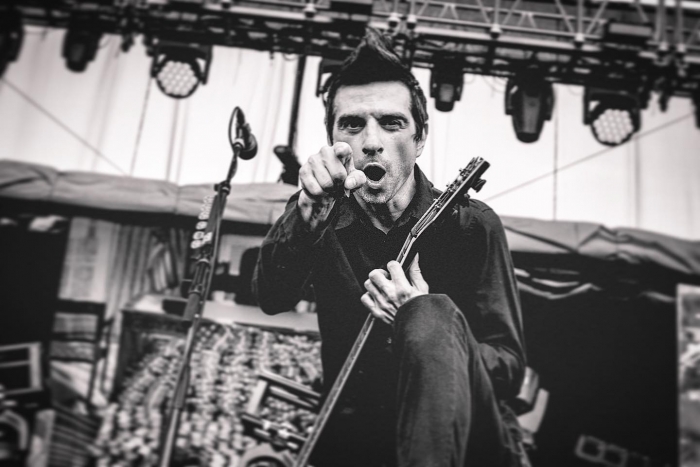
There’s a very human element to the film, whether it’s highlighting the member’s unexpected hobbies/interests or their candid testimonials. Again, you handled an inherently intense and personal matter in an artful and tasteful way. Having also lost a sibling, I was deeply moved by the section on Anti-Flag bassist Chris Barker’s sister. As a director, how do you approach something like that?
It's definitely tense. I've had sequences like that in three films that I've done and all of them were different. Whenever you're going to talk to somebody about a tragedy they've faced you need to let them know in advance so they don't feel ambushed. Chris knew we'd be talking about it that day.
I think it was our third sit down with him. So we were already comfortable at that point. It's a weird thing to sit down with someone and basically say "Let's talk about the worst thing that's happened to you". But just like the rest of the documentary it's about getting through it.
If they need breaks while shooting, give them it. And try to cover the subject as well as you can without making them feel like you're twisting a knife to up the drama. My approach to anything like that has been the same since I started working on documentaries.
The tragedy isn't what's interesting. What's interesting is how someone reacts to tragedy. So I try to spend minimal time recounting it, but dig down on what those people did next. I think that's how you can get at the most human part of the story.
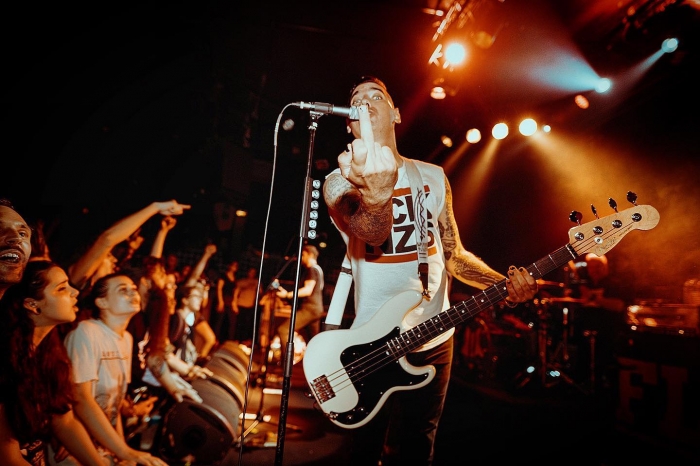
The end credits almost serve as a laundry list of changed lives. Again, you give a lot of space to fans and elevate important voices in the community. It’s an important document for fans of the band and of film in general. How’d that idea come together?
It was important to me to really connect the idea that it's not about the music. It's about the people listening to it and how it affects them. There are so many great albums that I know have changed me and I wanted to capture that, especially from the political standpoint.
It's so easy to make music that's defeatist and nihilistic. But making music that people connect to, to the point that they've changed careers, are protesting, and working to make the world better, is a very special thing. It's rare.
Clearly, COVID has altered everyone’s plans for, well, just about everything. What does the release of the film look like? How can people best track it down?
The film will be premiering on Oct. 3rd at antiflag.veeps.com. There are two tiers for tickets. One for just the film and one with a double-sided poster featuring designs from Midnight Marauder and Jay Shaw, who both designed posters for the film.
The band and I will be doing a Q&A afterwards. That should be a lot of fun. After that it will be getting a VOD and physical release.
You have another killer project on the works that’s likely to interest No Echo readers. Tell us a bit about Don’t Fall In Love with Yourself, the upcoming documentary about Justin Pearson (Swing Kids, The Locust, Three One G) and San Diego punk.
I'm really excited for that film! I've been an enormous fan of Justin's work since high school and we've known each other for quite a while now. The Anti-Flag doc was starting to feel finished and I was thinking about possible passion projects. I reached out to Justin and asked if I could do a doc on him and he was down.
It's almost done. This past spring we ran a successful kickstarter to raise finishing funds. COVID hit and that sidelined it up until now. We were all booked and ready to fly out to California for the final interviews in April, but had to cancel the trip.
We're working on some workaround plans right now and with any luck it'll be coming out some time next year.
Nobody escapes my lists! Seeing as you’re a filmmaker, what’re your Top 5 music documentaries?
One of my absolute favorite filmmakers is Les Blank. He's mostly unknown but he's one of the greats. He spent his whole career focused on documenting subcultures around America, often with poor people or people on the outskirts of society so I'd recommend any of his films. They're all fairly short. Usually 15-45 minutes. (A Well Spent Life, The Blues Accordin' to Lightnin' Hopkins, Spend It All, Hot Pepper, Sprout Wings and Fly, Sworn to the Drum)
- American Hardcore - It's essential. Enough said.
- One More Time With Feeling - A devastating look at the making of Nick Cave's Skeleton Tree, as he processes his grief from the death of his son.
- Metallica: Some Kind of Monster - One of the most hilarious things I've ever watched. It reads like an episode of Veep by way of metal. I just love how simultaneously humanizing and cringy it is.
- Junun - Paul Thomas Anderson's documentary about Radiohead's Jonny Greenwood traveling to Rajasthan.
***
Beyond Barricades: The Story of Anti-Flag will premiere on October 3rd via Veeps.
TurnStyle Films on social media: Facebook | Twitter | Instagram
***
Donate a few bucks to help with No Echo's operating costs:
***
Tagged: anti-flag

